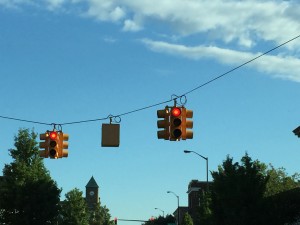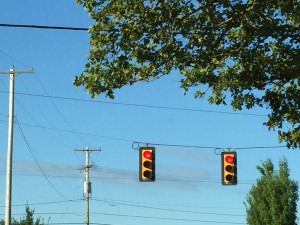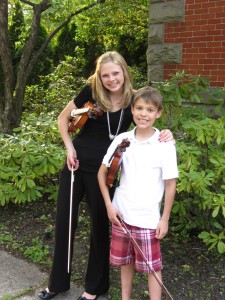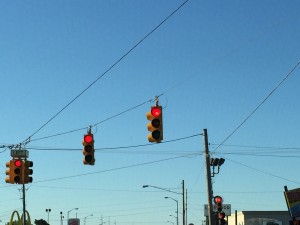Running Red Lights: Lessons in Discomfort
 Usually I’m a reasonably good driver, but this past week I accidentally ran two red lights and got a parking ticket*. One of the red lights was kind of a big deal. It was a busy intersection at rush hour with four lanes of traffic coming at me as I was trying to turn left in front of them. There were people laying on their horns and shaking their fists at me. It wasn’t pretty. I have a good excuse though: I started a new job in a different city. My brain was apparently focused on the new job and perhaps not focused enough on umm, driving.
Usually I’m a reasonably good driver, but this past week I accidentally ran two red lights and got a parking ticket*. One of the red lights was kind of a big deal. It was a busy intersection at rush hour with four lanes of traffic coming at me as I was trying to turn left in front of them. There were people laying on their horns and shaking their fists at me. It wasn’t pretty. I have a good excuse though: I started a new job in a different city. My brain was apparently focused on the new job and perhaps not focused enough on umm, driving.
It’s a fact of child development. When a child begins to learn a new skill, s/he may regress in another s/he had already mastered. A young child who begins eating solid foods may go through a temporary period of no longer sleeping through the night. Or a child who begins school may temporarily regress in terms of toilet training (good thing we’re past this when we start new jobs). There is a ‘disorganization’ and a ‘reorganization’ that goes on in the brain. It’s a good thing. There is a regression, but it is a signal that a burst of cognitive awareness is in the making – and then things all come back together at a higher level of all-around skill**.
Learning isn’t apparently the linear process we may traditionally think of. It’s more of a corkscrew model, where we learn something, repeat, revisit, and reflect. I had a boss years ago who used to say, “We’ve made good progress: we’re still confused, but at least now we’re confused at a higher level.” And there’s this model of learning which describes our levels of awareness with our clueless-ness:
- First we’re unaware of a new thing. (We’re ‘unconsciously incompetent’.)
- Then, we’re ‘consciously incompetent’. We know we need to learn a new thing and we’re working on learning it. We’re doing the hard work of trying, failing, trying again. The teenager is attempting to parallel park but runs over a few cones in the practice arena. S/he doesn’t yet have the skills and is working to learn them.
- Then, we’re ‘consciously competent’. We’ve begun to master the skills, but we have to think consciously about what we’re doing. It’s a clunky process. The teenager has to think consciously about stopping, putting on the blinker, looking all ways at a busy intersection. This conscious process takes focus and a lot of energy. It’s hard work. It also grounds us in the present moment and the task at hand.
- Eventually, we’re ‘unconsciously competent’ and skills become second nature. We no longer have to process things consciously. We just drive without thinking about what we’re doing. We can go on autopilot.
My theory is that when we’re learning something new it’s tough because we have to think consciously about things that might have been second nature before. There’s friction in our day that we didn’t have before. We’re working hard to do the right thing, learn fast enough, and drink from the proverbial fire hose.
It’s a challenge. My children played Suzuki violin starting when they were each four years old. It was a method that emphasized learning by listening, and the parent-child-teacher partnership in the learning process. It was also a method where you the child was always stretching to the next song or skill. They were constantly in that uncomfortable place of not knowing – of not having the ability to play a new song perfectly – of learning to deal with the frustration of not hitting that note. There were also monthly group learning sessions. At these, they could always look at children who hadn’t learned as much as they had, and they could always see children whose skills were ahead of their own – and that was motivating.
I think there’s some magic in learning to be comfortable in discomfort.
If we can’t be comfortable not knowing – in not being good at something – then we’ll never stretch or take a risk. We’ll never grow. If we always praise children (or ourselves) for doing a good job, then they’ll never want to fail. They’ll avoid risk. On the other hand, if we praise our children (and ourselves) for hard work and good effort, then we’ll strive more and farther and therefore learn from the new challenges that we place in front of ourselves.
Learning also requires humility.
We have to be willing to look stupid, to ask the dumb question, to not have the answers. Sometimes this can be tricky. As adults we’re usually pretty comfortable doing what we do – and we’re not frequently uncomfortable. But real learning requires stretch. We have to be open to new things, new perspectives, and to getting instructions. It makes us vulnerable to those around us. In a good way.
I don’t have this figured out, but here’s my theory: I think learning is about humility and discomfort. We have to be open and humble – admitting all the stuff we haven’t mastered. We also have to be comfortable with not knowing, and with the disorganization that precedes a cognitive burst (can’t wait for that!). Our brains are working hard. While we’re learning something new, other things may suffer.
We may even find ourselves running red lights.
 *I swear I prepaid that meter for 3 hours…but…perhaps…umm…there was some user error on my part…
*I swear I prepaid that meter for 3 hours…but…perhaps…umm…there was some user error on my part…
**The child development reference above is to the Touchpoints model of child development from T. Berry Brazelton, my favorite child development expert.

